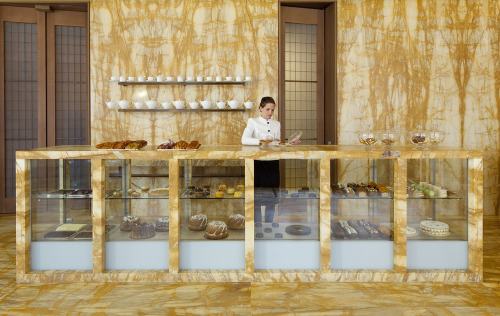{Had shown parts of this hotel by David Chipperfield before, but came across some new-ish photos&hel
{Had shown parts of this hotel by David Chipperfield before, but came across some new-ish photos… that one through the wood and brass doors in particular keeps popping up in my radar. Also, the food display/counter and ALL THAT ONYX(?) is just sublime!}David Chipperfield takes regular trips through history, bringing the grandeur of large public spaces out of the past and into the 21st century. Unsurprisingly for this radical architect, beautiful museums and galleries and austere hotels and offices are the meat of his creative output. A few years ago, he took a sympathetic look at the large public drawing rooms of the late 19th and early 20th centuries and fed that inspiration into a design for a 5 star luxury hotel on London’s Regent Street, called–appropriately–Hotel Café Royal.Location is the best way to approach this stunning project: it is situated right twixt creative Soho and elegant Mayfair, and there’s no better way to describe Chipperfield’s Hotel Café Royal that taking an elegantly creative look at the past through the sensibilities–and sympathies–of the modern.The hotel has a personality all its own, accumulating an eclectic mix of mythologies of the rich and famous. Here, Oscar Wilde hit the absinthe so hard he hallucinated a waiter was actually a gardener. Here, David Bowie formally (i.e. with a party) retired his alter ego Ziggy Stardust, and later planted one on Lou Reed that same night. Elizabeth Taylor and Richard Burton rendezvoused in these halls, and Winston Churchill, George IV, and Princess Diana were some of the royal-politico characters frequenting its hallways.On the regal note, as we approach Hotel Cafe Royal we are faced with a regally neoclassical Hausmann-ish facade that bespeaks luxury and elegance, and marble clad reception areas live up to that reputation; while a Parisian brasserie greets guests on a sweeter note. All of it is intoned, set off, augmented and accentuated by Art Deco fireplaces, Louis XVI detailing, stained glass, original French insignia from 1865, gold leafed and scarlet velveted rooms, a caviar and champagne lounge, and a tea room.There’s a bit of time travel undertaken as guests make their way from these grand reception and dining areas to the private areas of the rooms, namely, a trip from the past to the current, in which hallways are updated with a sleek, refined, modern look, adopting styles ranging from the East to the West. Zen-like screens act as partitions while minimalist rooms are accented by enormous bathtubs cut from marble slab, inset in the wall stage-like (complete with curious lighting systems as well).The interior domestic spaces are not robust and showy, they are meditative and contemplative, with well-defined contours and frugal use of extravagant colors. Furniture colors are pale and recede into the background like a 3D canvas on which the human drama of living is played out in; amongst; against. This is crucial from the aspect of hospitality, showing that luxury and human interest can definitely commingle and even compliment each other. -- source link
Tumblr Blog : houseandhomme.tumblr.com
#interiors#interior design#design#architecture#david chipperfield#london#modern interiors#modern design#restaurant interiors#hotel interiors#restaurant design#hotel design







